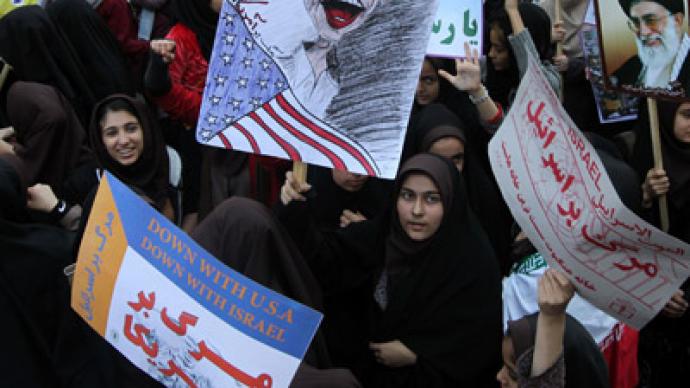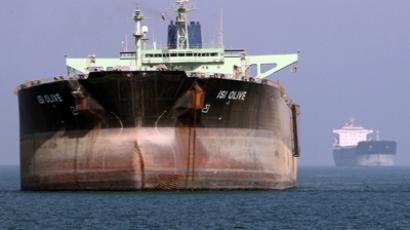Iranians burn American flags, chant 'death to US' to mark embassy seizure

Thousands of Iranians have gathered in Tehran, setting US flags on fire and chanting “Death to America.” The demonstration marks the 33rd anniversary of the taking of the US embassy, in which 52 Americans were held hostage for 444 days.
The demonstrators also shouted anti-British and anti-Israeli slogans, and burnt Israeli flags in front of the former embassy building. The premises are now controlled by Iran’s elite Revolutionary Guards, and currently serve as a training and educational facility. The building, which is covered in anti-US murals, was named a “den of spies” by the authorities that sponsor the annual commemoration.
Remembering history
On November 4, 1979, Islamist students calling themselves “Muslim Student Followers of the Imam’s Line” invaded the grounds of the US embassy and seized its staff. Fifty-two US diplomats were held hostage for 444 days. After failed negotiation attempts, US President Jimmy Carter ordered a rescue mission, which tragically ended in the deaths of eight American servicemen and one Iranian civilian. The hostages were finally released to the US after the signing of the Algiers Accords which, among other provisions, included a vow that Washington would not interfere politically or militarily in Iranian internal affairs. The motives for the hostage-taking date back to 1977, when Carter angered Iranians by giving a televised toast to the country’s then-leader, Shah Mohammad Reza Pahlavi, declaring how beloved he was by his people. The move angered Iranians who did not support the shah.Two years later, after the revolution and removal of the shah in 1979, Carter once again angered Iranian citizens by allowing the shah to go to the US for medical treatment. This intensified Iran’s anti-American sentiment and sparked rumors of the reinstatement of Pahlavi and another US-backed coup. The first coup occurred in 1953, when British and US spy agencies helped Iranian royalists depose of the government of the country’s prime minister and restore Pahlavi back to power. Some political analysts believe the hostage crisis was a prominent reason Carter lost the election in 1980.
Nuclear tension
The US and its allies have long accused Iran of using its nuclear facilities to develop atomic weapons – a claim which Tehran adamantly denies. The subject has been an ongoing source of tension between Iran and those countries which remain skeptical of its nuclear ambitions – mainly the US and Israel.Israel has hinted at taking military action against Iran’s program for some time. This week, Israeli Defense Minister Ehud Barak estimates the country and its allies will have to make a decision regarding a military solution in “eight to 10 months.” While Israel would prefer to have US support in a pre-emptive strike against Iran, it remains unclear whether such support will ever come, as the US continues to prefer a diplomatic solution to the conflict.In September, Gen. Amir Ali Hajizadeh, a senior commander in Iran’s Revolutionary Guard, warned that Tehran would target US bases in the territory if Israel attacked Iran. “We will enter a confrontation with both parties and will definitely be at war with American bases should a war break out," he told Al-Alam TV.
Western sanctions against Iran
The delicate relationship between Washington and Tehran is also due to numerous sanctions placed against Iran. Last June, the US banned the world’s banks from making oil-related transactions with Iranian financial institutions. Previous US sanctions ban almost all trade with Iran – with certain exceptions for activity “intended to benefit the Iranian people.”The European Union has developed its own set of harsh sanctions against Iran too. Just last month, the EU banned the import of Iranian natural gas into member nations. It also placed a ban on financial transactions between European and Iranian banks, with some exceptions for those involving humanitarian aid, food, and medicine purchases. The EU had previously banned the import of Iranian oil to member states.
Innocence of Muslims
In September, anti-American sentiments in Iran were fueled by the anti-Islam film Innocence of Muslims. Iran became just one of many countries in the Muslim world to speak out against the film.A senior government official vowed to “track down” those responsible for making it. Iranian President Mahmoud Ahmadinejad accused the film of being an anti-Israel conspiracy, claiming it was a plot by the Jewish state to "divide [Muslims] and spark sectarian conflict." The country also boycotted the 2012 Oscars as a protest against the film.
US elections and Iran
The flag-burning demonstration comes just days before Tuesday’s US presidential election.In the foreign policy debate between the two presidential candidates, President Barack Obama said his administration has shown strength against Iran by enforcing the “toughest, most crippling sanctions ever." He also stated that the US would not engaged in perpetual nuclear negotiations that go nowhere and that the US would only accept an agreement that ends Iran’s nuclear program. However, rival candidate Mitt Romney’s words were much harsher, and have many wondering whether the relationship between Washington and Tehran will only worsen if he wins Tuesday’s election. Romney called Iran’s nuclear program America’s “greatest threat,” and pledged to implement new sanctions while tightening old ones. He also said he would push for greater diplomatic isolation.














